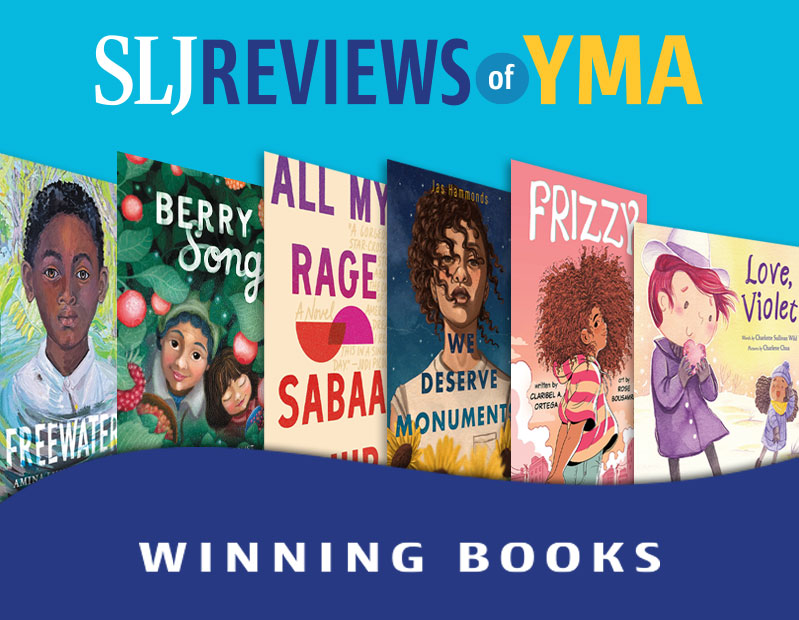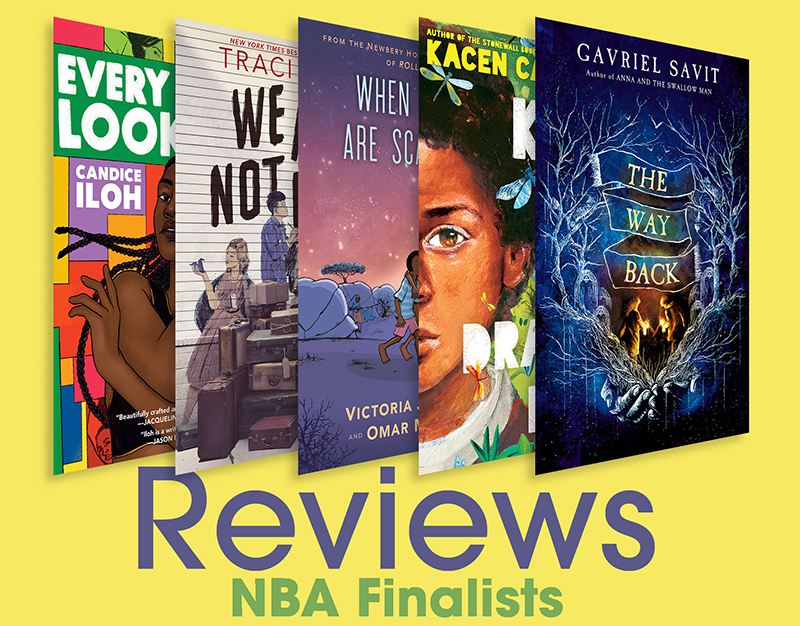Gaiman’s Gold
The SLJ front page headline reads “Finally! The Newbery Goes to a Popular Book” *…but the medal-winning author, Neil Gaiman, seems to actually understand this award:
“The Newbery is far and away probably the most important,” he says. “It means you are seen as being part of a group of books that are of quality and ensures survival over the years. You are part of some kind of strange literary canon, that maybe you’ve written a book that will outlive you.”
The Graveyard Book was awarded the Newbery Medal because of its distinguished literary value. It’s certainly good news that it also is popular. I’m happy for the Newbery itself that this book may answer some of the concerns brought up in Anita Silvey’s article…but I hope people don’t assume that somehow it was this article, or the book’s popularity, that garnered it the award. The book is simply outstanding, far and above any other this year.
ADVERTISEMENT
ADVERTISEMENT
I’ve heard some people complain about the episodic chapters and lack of character development. Yet I find the episodes build very purposefully to build an underlying sense of narrative tension and character development like a wave builds from the ocean floor: you only really see it in the magnitude of its final crescendo. The prose is lucid and surprising and elegant and natural. Characters and setting are instantly drawn. There is a subtlety in the delivery that is observant of a child audience without being patronizing.
I’m also appreciative of the breadth of quality represented by the committee’s choice of honor books. Though not a fan of all of them, and though I’m sad not to see The Porcupine Year up there, I think that the variety of genres, styles, audiences, and uses of language show that the committee has used the criteria well to find gold among both apples and oranges.
Despite the fact that I dispute many of the recent criticisms of the Newbery, I’m glad to see people’s attention turn to it, and glad that we are challenged to make sure we hold to its charge and keep it relevant. While I think that many will feel their criticisms are “answered” by this year’s selection—I also suspect that people who want to complain about it will still find plenty to complain about.
It’s ultimately the conversation, and the widening of the conversation, that compels me to run our Mock Newbery, and has been the fun of this blog. It’s why, in part, The Graveyard Book was not part of our discussion list…because not including it provided a part of the discussion. I’m perfectly happy being “wrong” under these circumstances. Predicting the awards has always been secondary to me. Understanding and celebrating them is the point.
Again, if you’d like to see my earlier posts on this book, check here and here. Also check out the great initial comments on my earlier post today.
The full press release text for the Newbery winners is up on the ALSC site, including quotes from the committee on why each title was selected.
And the full press release listing all of the awards is finally up here.
* [Updated: Sometime in the last hour the SLJ headline changed from "Finally!:" to "Surprise!" I’ll leave my post as is though. 🙂 ]
Filed under: Uncategorized
About Nina Lindsay
Nina Lindsay is the Children's Services Coordinator at the Oakland Public Library, CA. She chaired the 2008 Newbery Committee, and served on the 2004 and 1998 committees. You can reach her at ninalindsay@gmail.com
ADVERTISEMENT
ADVERTISEMENT
SLJ Blog Network
2024 Books from Coretta Scott King Winners
Monster Befrienders and a Slew of Horror/Comedy: It’s a Blood City Rollers Q&A with V.P. Anderson & Tatiana Hill
Monkey King and the World of Myths: The Monster and the Maze | Review
Parsing Religion in Public Schools
ADVERTISEMENT








“The Newbery Medal ended its slump today.”
UGH
The Horn Book site has the original reviews of the five Newbery winner and honors books. Follow the links off of Roger Sutton’s blog. The funny thing is that the only book to get a starred review from the outset from Horn Book was The Graveyard Book. Yet, I’m sure there were probably dozens of middle-grade books that received starred reviews from Horn Book over the past year. It just goes to show how completely subjective this whole thing is…
But the thing about starred reviews is that their criteria are not the same as Newbery/Printz/Caldecott criteria. No matter how many starred reviews Little Brother got (I think there were three, at least), it wasn’t going to win any “distinguished literature” awards.
I’m soooo glad to see that I am not the only person that is disgusted with the title and, in general, the anti-Newbery tone of the arcticle! I’ll agree with Sharon in saying “UGH!” At least the author seemed to have some enthusiasm. Thank Goodness. I took an opportunity to try to read (I say try because I’ve tried before to no avail. I find it rather disturbing, personally…) the Anita Silvey arcticle in question. I actually got through it this time, but let me tell you, there is a convincing counter-argument for nearly every sentence in that thing! I personally have loved all of the titles of the past few years. In fact…I am probably the only person who thinks that “The Higher Power of Lucky”, “Criss Cross”, “Kira-Kira” and especially “Good Masters! Sweet Ladies!” are all better books than “Holes”. I know that I am hearing groans from around the globe at this moment, but this is just my opinion. “Holes” is popular, but I think there is just a little too much hype; I was sort of set up for disappointment when I read it…and the others are so beautifully done too. I think it is unreasonable to expect everyone to like every book, but I think in this case it is the bad rap that all these books have been getting that’s a little more than a tad unreasonable. I found them all distinguished in their own different ways. That goes for “Holes”, too! That is what makes them all great, in that in almost any given Newbery case, in my experience, there is not quite one quite like it or, I think, quite as good. Literature is subjective, just like any other art, so saying that the comittee is choosing a “special” book instead of a “universal” one and using that as a negative is very unfair. I think that is what makes the Newbery so hmmm….special! And so good!
Ok, I’ve been going back and forth about saying something, and I’ve decided I’m going to say it. Honestly people, stop sounding like a bunch of huffy, snooty English majors in response to SLJ’s article about the Newbery winners! First off, the magazine was the one who published Silvey’s article in the first place, so it’s safe to assume that there’s at least one editor who agrees with her. And secondly, read the comments to her article: most children’s librarians agree that most of the winners in this decade DO NOT have child appeal. They’ve tried to give the books to children, to booktalk them, etc. with little success. What is the use of an award for children’s books if the books that win don’t appeal to the intended audience? The Newbery is not the Pulitzer or any other award for literature. Those are awards chosen by adults for adults. The Newbery is chosen by adults for children. Shouldn’t whether the book appeals to children be important? Like it or not, it’s in the criteria, and therefore it needs to be considered. I am sick and tired of all this snobby attitude about criticism of the award. Child appeal be just as important as any other criteria for the award and I for one am thankful that this committee at least appears to have chosen to look at it that way. How can your book live on forever when the intended audience groans at thought of reading it? Let’s quit the whining and celebrate a book that has child appeal and literary quality!
Anonymous–reading Silvey’s article, it is not at all clear that “most children’s librarians” agree. She has talked to many people, but identifies none, and even “a hundred” people is a small sampling. The many responses you’ve been reading on the opposite side are being expressed in order to try to put this into balance.
I’m puzzled when you say that the Newbery “is not the Pultizer or any other award for literature,” since it IS an award for literature. Child appeal is a criteria, and is considered–but popularity is not a criteria. There’s a difference.
We are celebrating this book–so why are you whining?
I deal with children every day on almost all levels, from having them brush their teeth to discussing books. The response to most activities is that the activity an adult is discussing generally does not have an initial appeal. Many times it is the way in which an event is perceived that a kid responds to such as a ”
I deal with children every day on almost all levels, from having them brush their teeth to discussing books. The response to most activities is that the activity an adult is discussing generally does not have an initial appeal. Many times it is the way in which an event is perceived that a kid responds to such as a ”
Anonymous, I deal with children every day on almost all levels, from having them brush their teeth…to…discussing books. The response to most activities is that the activity an adult is discussing generally does not have an initial appeal. Many times it is the way in which an event is perceived that a kid responds to such as a “have-to.” task.
I have sponsored many a bookclub for children. We let the kids choose books and the parents also choose. A childs intial interest in a book is generally not a good predictor of their final comments or enthusiasum. Eventually, most kids in my groups begin looking forward to the discussions. I think that my telling them they can “Feel free to hate the book and we will discuss that too,” helps children set aside why they “think” they won’t like a book.
I feel that just because kids are saying they are not interested in reading a book has less to to with the actual book and more to do with the fact that they don’t want to read.
I have not found anything on the blog to sound huffy, snutty or snobby, in fact I agree with Nina’s comments regarding conversations and differing opinions on the subject of book choice working to enhance the process. After reading over what the actual Newbery criteria states, I tend to be able to understand completely why most titles that win the medal do so.
sorry about the multiple response–not sure why that happened.
My comment was more to point to all the “whining” that I perceived in response to the way SLJ phrased their article about the Newbery. There appeared to be some complaint about the usage of the words “Surprise!” and “Finally” which I thought was snobby and ridiculous. Those words are exactly what myself and several colleagues feel about Gaiman’s win. As for what I wrote about Anita Silvey’s article, I was referring not to comments in the article itself, but to the comment thread on SLJ. Most who wrote on there agreed with Silvey’s assessment, however undocumented, about the awards. I run a book group, a co-worker runs a book, and both of us can tell you that yes, kids like picking their own books. But even when shown some of the recent Newbery winners, the reaction is pretty blah. And that’s the response most librarians who wrote in the comment thread were pointing to. The snobbery refers to what I perceived as irritation that the Newbery is getting criticized and what feels like the assertion on here that the awards are all about quality literature and that child appeal doesn’t matter or can’t be quantified. Yes, the awards are about quality literature, but child appeal is included and I feel that a lot of people forget that. And that’s why I celebrate Neil’s win, as it is, as Nina pointed out, the perfect melding of child appeal and quality literature. We don’t have to have one without the other!
Anonymous, thanks for clarifying. Well, yes, I am complaining about the use of “Surprise” and “Finally”…which to me is gratuitous: why celebrate this year’s Newbery by dragging down others? I’m not so upset with the FACT that the Newbery is getting critized as the WAY it’s being critized–without full context. “Child appeal” IS a part of the definition of “quality literature” within the award…but “child appeal” itself does not necessarily mean a BROADness of appeal. Of course we all wish each Newbery will be widely popular! But sometimes the best books of the year aren’t…which doesn’t make them any less “distinguished.” In the end, what disgruntles me about the SLJ headline and the first line (“ending its slump”) is the implication that the medal went to Gaiman in ORDER to buck the “trend” of the last few years. Each year’s committee works in a vaccuum: looking at that year’s books only. Imagine if The Graveyard Book didn’t exist. Which book do you think would have been deserving of the win this year? Would it have been so widely popular? The Graveyard Book is a one of a kind…the sort that comes along infrequently. It’s the next “Holes,” perhaps. But we just don’t GET a book like that every year. I think it’s important that we look critically at this award, and others. But making one-sided attacks about it undermines the discussion: it puts all of us on the defensive, instead of getting us each to really examine our points of view. Silvey and the SLJ reporters could have written articles that presented different sides of the argument in order to support their ultimate editorial point of view. But they didn’t.
(First off, I want to apologize if I cam off nasty in my original comment. I’m simply tired of what I perceive as literary snobbery when it comes to this award. I think we as librarians should feel irritated that the word “finally” is used in regards to child appeal as that implies that we’re not doing our job in picking quality books that kids will like. It’s the old “librarian with a bun” stereotype.) Nina– you’re absolutely right about Silvey’s article. While I agreed with much of what she was saying, I wish that she had given concrete examples, statistics, etc. to illustrate her points. Much of what she used to make her argument was made using points like, “some librarians” which really tells us nothing. I don’t think SLJ was making the point that the committee picked Gaiman to “buck the trend” but I certainly do hope that the committee was paying attention to the controversy. Not to have it influence their decision but to hopefully cause them to look at the criteria more critically. Yes, not every distinguished book will have broad child appeal, but my personal feeling is that many of the award winners in this decade don’t have much child appeal at all. Or if they do, it’s only to a teeny, tiny minority of children. I think we should be a bit broader in regards to choosing books for awards, not to lessen the importance of the award, but rather to be able to hold up the books and say, “See, children’s literature can be just as well-written and valuable as adult literature. And it can actually appeal to children!” I know that when/if I’m ever on the Newbery committee I will strive to consider both quality and appeal equally. It may not happen, but it’s worth the effort!
Anonymous, see this is why the needlessly-hyper-provocative angles bug me–because you and I are more in agreement than it would have seemed from the start. I can tell you with certainty–from conversations that I had with several of this year’s committee members–that they certainly paid attention to the controversy. I also want the general public to be able to recognize that 1)children’s literature is as of high quality as any other literature, and that 2)most librarians DO know about child appeal. I think that the wider the appeal of Newbery winners, the easier it will be to convince people. However–I don’t think it’s realistic to place this burden to deliver this on the Newbery committee, since the wideness of appeal is not in their charge. It IS realistic to remind them to consider appeal (which is PART of the measure of literary quality, and not in opposition to it!). But it’s also OUR job to promote the winners. We shouldn’t expect that every winner will be easy–or appropriate–to promote to each of our audiences. (I hope that the third grade teachers who read Tale of Despereaux to their classes are thinking long and hard about whether to do the same with The Graveyard Book). But there is a breadth in style and audience among Newbery winners and honors over the years that we can draw on to promote it. If a year’s winner is not to taste: why not use that to talk about subjectivity in literary criticism, rather than Newbery-bashing? By awarding books with clear literary merit, we set a bar for aspiring writers, that will help our cause in the long run. Librarians are a ”
*rest of my comment*
Librarians are a *narrow* group of people overall…though I think we tend to know what we’re doing, we do need to be prodded to remember to listen to voices outside our regular circle. I can thank SLJ for that much…and for allowing me and Sharon space on this blog to dispute their otherwise ill-formed claims. (And thanks, Anonymous, for having this out with me.)
that IAF was me…who also gets tripped up in this software…